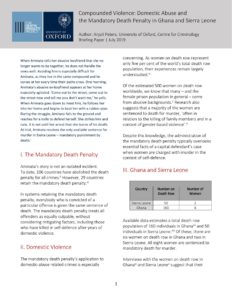
Compounded Violence: Domestic Abuse and the Mandatory Death Penalty in Ghana and Sierra Leone
- News
- 6 Aug 2019
Research Paper by Anjuli Peters, University of Oxford, Centre for Criminology. This paper was produced as part of a Msc dissertation and the DPP-Oxford Criminology Research Internship Programme 2018.
*Published with permission of the author
When Aminata tells her abusive boyfriend that she no longer wants to be together, he does not handle the news well. Avoiding him is especially difficult for Aminata, as they live in the same compound and he curses at her every time their paths cross. One morning, Aminata’s abusive ex-boyfriend appears at her home especially agitated. ‘Come out to the street, come out to the street now and tell me you don’t want me,’ he yells. When Aminata goes down to meet him, he follows her into her home and begins to beat her with a rubber pipe. During the struggle, Aminata falls to the ground and reaches for a knife to defend herself. She strikes him and runs. It is not until her arrest that she learns of his death. At trial, Aminata receives the only available sentence for murder in Sierra Leone – mandatory punishment by death.
Aminata’s story is not an isolated incident.
To date, 106 countries have abolished the death penalty for all crimes. However, 29 countries retain the mandatory death penalty. In systems retaining the mandatory death penalty, everybody who is convicted of a particular offence is given the same sentence of death. The mandatory death penalty treats all offenders as equally culpable, without considering mitigating factors, including those who have killed in self-defence after years of domestic violence.
This research paper applies a gendered perspective to women sentenced to a mandatory death penalty in the West African countries of Ghana and Sierra Leone. At present, there are six women on death row in Ghana and two women on death row in Sierra Leone. All eight women are sentenced to mandatory death for murder. However, interviews with the women on death row suggest that their offences do not meet the threshold of ‘most serious crimes.’ Instead, many are convicted for acts committed in retaliation following violence against them. The author argues that ignoring essential contextual facts concerning domestic violence violates Articles 6(1) and 6(2) of the International Covenant on Civil and Political Rights (ICCPR) which makes clear that ‘in countries which have not abolished the death penalty, sentence of death may be imposed only for the most serious crimes’ and cannot amount to an arbitrary deprivation of the right to life. The paper then considers the argument for abolishing the mandatory death penalty in favour of a discretionary sentencing regime. However, a survey of mental health resources available in both countries suggests that Ghana and Sierra Leone do not have the mental health resources to support a discretionary capital punishment system in practice. This paper concludes that without adequate resources, the most effective way for Ghana and Sierra Leone to protect human rights standards is to abolish the death penalty altogether.
Read the summary briefing note

















